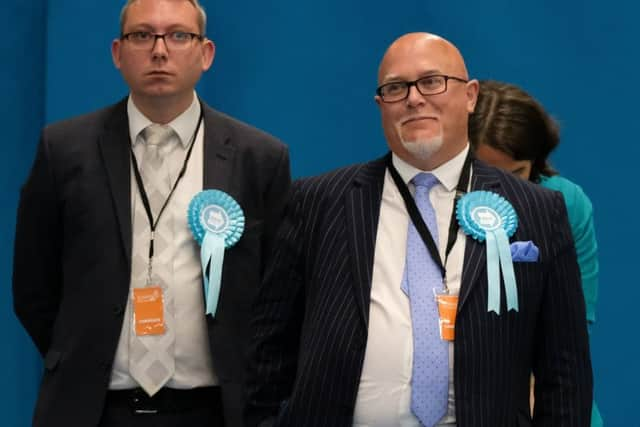Brian Monteith: It is my last week as an MEP, here is what I’ll do
By any standards this is a momentous week. No matter how you view Brexit, positively as the return of large amounts of sovereignty to the UK, negatively as the abandonment of a progressive political project, or with sheer exasperation and boredom, leaving the European Union at 11 o’clock this Friday evening is an historical event.
For me it also marks my last week as a Brexit Party member of the European Parliament, a week when I and my colleagues have to decide whether or not to give our backing to the government’s Withdrawal Agreement. For, despite the signatures of the EU Commission and UK Prime Minister, or that the Withdrawal Bill finally achieved parliamentary approval and received royal assent to become an Act – the European Parliament still has to give it its blessing, otherwise we shall leave the EU but without the transition arrangements (or any alternatives) in place.
Advertisement
Hide AdAdvertisement
Hide AdMoreover, it also will mark what Nigel Farage has called the mothballing of the Brexit Party, our stepping back from political campaigning and the proffering of candidates in elections due in the coming months, such as mayoral contests and various local council contests.


All of these events are, of course, interlinked. The Prime Minister won a handsome majority of 80 MPs in the general election, giving him the mandate and power to pass his version of Theresa May’s Withdrawal Agreement. It was offered to, and received, the approval of the British people. Whatever the criticisms my party have, and they are both serious and legion, we did not win a single MP in what was, after all, the Brexit general election. Getting Brexit done was undeniably high on people’s agenda, no matter the quality of the “deal”. Boris Johnson managed to achieve that victory in large part because the Brexit Party chose to stand down all of its 207 parliamentary candidates who were ready to fight Tories in the seats they had won in 2015. Nigel Farage took that decision because he secured from the Prime Minister commitments that stretched the Withdrawal Agreement further, promises that did not require the EU’s consent and would not have transpired had we capitulated like four MEP defectors had demanded.
The first was that whatever happens in the coming negotiations for a future relationship with the EU (much more than just a trade deal) the 11-month transition period would end on 31 December of this year – with no further extension, which until the PM’s oath was being viewed as highly likely. This commitment has since been put into the Act and is now the law. To resile from it would require parliamentary approval, which while possible would be hugely embarrassing and put the Prime Minister in breach of trust with the British people.
Johnson went further. He assured Farage he would seek a Canada/EU-style trade agreement with no political alignment. This promise is also, thus far, on track to being delivered.
The Chancellor, Savid Javid, has talked about the importance of the UK being able to diverge away from EU regulations, behaving like any other normal country not enmeshed in the EU’s nets of bureaucratic arrangements, political trade-offs and international entanglements. Of course any British company seeking to export to the EU, be it parts for a car’s gearbox or the whole automobile, will need to comply with the regulations it has in place – just as they would need to comply with the rules of China or the United States if they were exporting there.
What is different is UK companies that are not exporting to the EU, or indeed not exporting at all, will no longer need to comply with the EU’s internal market rules as they do now. We shall be able to diverge – and, be they hairdressers, restaurateurs or the vast majority of our businesses (over 90 per cent) will be freed from previous restrictions if we choose to abolish them.
Welcome though these commitments were, they did not change the fact that in itself the Withdrawal Agreement stinks. It betrays the Union by creating a customs border for trade between Northern Ireland and Great Britain down the Irish Sea. Despite the Prime Minister’s repeated denials there will be no bureaucratic obstacles, local manufacturers in Ulster are already pointing to problems with paperwork. It leaves our fishing communities at the mercy of the Common Fisheries Policy for a year, with the continued threat that denying open access to the EU will be used by its negotiators as a deal-breaker for a wider trade deal on goods and services. Then there is the continued commitment to hand over nearly £40 billion of public funds for financial commitments that would not stand normal tests of any independent scrutiny or audit.
Nevertheless, the commitments given to Nigel Farage by the Prime Minister now give the UK negotiating team far greater leverage to agree a good future relationship from the EU than at any time since Theresa May decided recklessly to allow Michel Barnier to set the sequencing of the negotiating agenda.
Advertisement
Hide AdAdvertisement
Hide AdThis week my colleagues and I shall have to decide if we can hold our noses and ignore the stench of a bad transition agreement because of the Prime Minister’s commitments to procuring something better in the next stage – considering if the evidence before suggests he is indeed sincere on these matters. Were Johnson to go back on his word and seek another extension or sign away our futures, be in no doubt Nigel Farage will be dusting down his suit for yet one more comeback tour.
Brian Monteith MEP is chief whip of the Brexit Party in the European Parliament